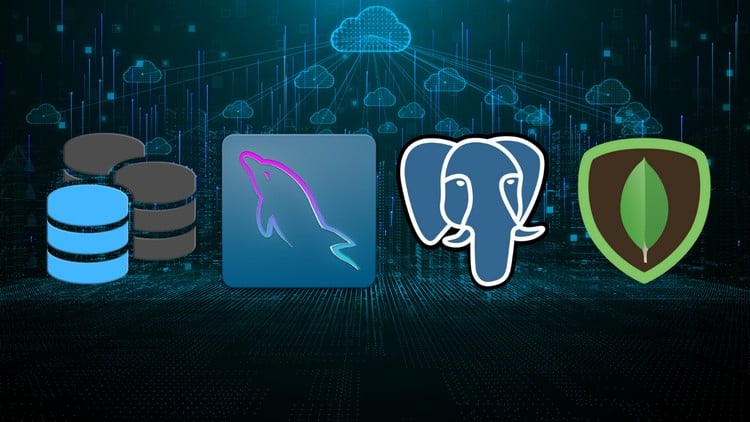
Master the Fundamentals and Advanced Techniques of SQL, MySQL, PostgreSQL, and MongoDB with This All-in-One Course..
⏱️ Length: 6.1 total hours
⭐ 4.29/5 rating
👥 33,236 students
🔄 May 2025 update
Add-On Information:
Note➛ Make sure your 𝐔𝐝𝐞𝐦𝐲 cart has only this course you're going to enroll it now, Remove all other courses from the 𝐔𝐝𝐞𝐦𝐲 cart before Enrolling!
-
Course Overview
- This ‘All-in-One Database Course’ offers a comprehensive introduction to relational and NoSQL database management.
- Master SQL fundamentals and advanced techniques for MySQL and PostgreSQL, covering structured data manipulation.
- Explore MongoDB, a leading NoSQL document database, for managing flexible, scalable, and unstructured data effectively.
- Emphasizing practical, hands-on learning, the course prepares you for real-world data challenges in various tech roles.
- With a 4.29/5 rating from 33,236 students and a May 2025 update, the curriculum is highly relevant and effective.
- Gain a holistic understanding of data storage, retrieval, and manipulation across diverse paradigms for immediate application.
-
Requirements / Prerequisites
- Basic Computer Literacy: Fundamental computer operation and internet navigation skills are entirely sufficient to begin.
- No Prior Database Experience: This course is specifically designed for absolute beginners, requiring no previous database knowledge.
- Stable Internet Connection: Essential for streaming course lectures, downloading necessary software, and accessing online resources.
- Eagerness to Learn: A genuine interest in understanding data storage and management will significantly enhance your learning.
-
Skills Covered / Tools Used
- Database Architecture & Design: Learn to conceptualize and design efficient database schemas for both relational and NoSQL systems.
- Advanced SQL Querying: Master complex joins, subqueries, and sophisticated aggregation functions beyond basic data retrieval.
- Relational vs. NoSQL Paradigms: Understand the strategic advantages and optimal use cases for structured versus document-oriented databases.
- Data Integrity & Constraints: Implement primary keys, foreign keys, and other constraints to ensure data accuracy and consistency.
- Query Performance Optimization: Gain foundational knowledge in analyzing execution plans and implementing effective indexing strategies.
- Database Setup & Administration: Learn to install, configure, and manage MySQL, PostgreSQL, and MongoDB instances locally.
- Data Definition Language (DDL): Proficiency in defining, modifying, and dropping various database objects in SQL environments.
- Command Line & GUI Interaction: Develop skills in interacting with databases using both terminal commands and graphical tools.
- Document Modeling in MongoDB: Master unique approaches to modeling, querying, and managing JSON-like documents within MongoDB.
-
Benefits / Outcomes
- Become a Versatile Database Professional: Acquire a highly adaptable skill set across key relational and NoSQL technologies.
- Significant Career Advancement: Enhance your resume for sought-after roles in development, data analysis, and junior database administration.
- Informed Technology Selection: Develop the critical ability to choose the most suitable database for specific project requirements.
- Practical Data Problem Solver: Gain confidence in designing and troubleshooting complex data storage and retrieval systems.
- Strong Foundation for Specialization: Build a solid base for advanced studies in data science, cloud databases, or specific database certifications.
- Efficient Data Management: Master techniques for ensuring data integrity, security, and high performance across various platforms.
-
PROS
- Exceptional Value Proposition: Uniquely covers four prominent database systems within one course, maximizing learning efficiency and breadth.
- Student-Approved Quality: High rating and large student base signify proven effectiveness and respected instructional content.
- Always Current Content: The May 2025 update guarantees up-to-date materials reflecting the latest industry standards.
- Broad Skill Diversification: Provides a highly desirable, diversified database expertise, enhancing marketability to employers.
- Beginner-Friendly Pedagogy: Expertly crafted to guide newcomers through complex database concepts with clear, practical examples.
- Time and Cost Efficient: Offers a streamlined learning path, eliminating the need for multiple, separate database courses.
-
CONS
- Foundational Depth for Breadth: At 6.1 hours across four systems, coverage may be foundational, requiring further self-study for advanced mastery of each.
Learning Tracks: English,Development,Database Design & Development
Found It Free? Share It Fast!